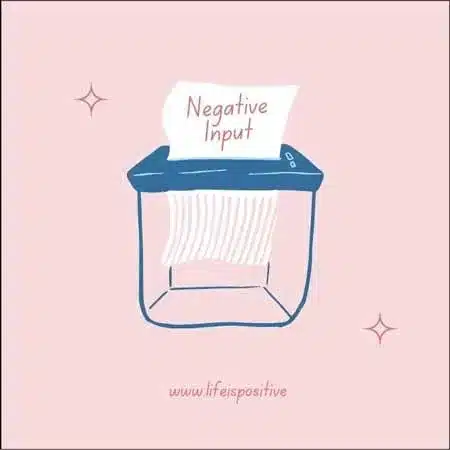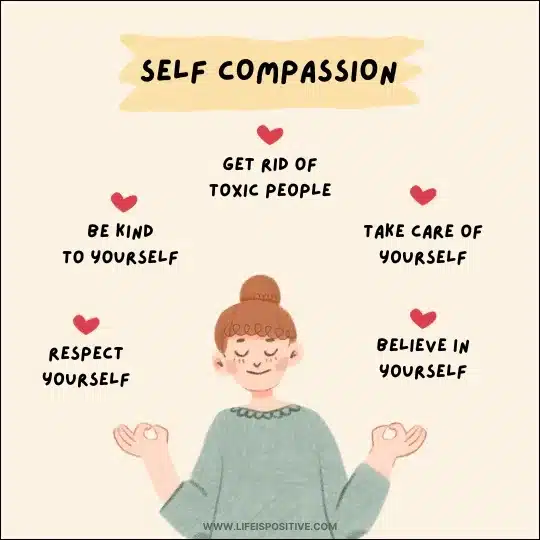|
Getting your Trinity Audio player ready...
|
Embarking on a journey toward a brighter, lighter you? Let’s start by decluttering your social circle!
‘Why you should be removing negative people from your life’ isn’t just about saying goodbye; it’s about saying hello to peace, positivity, and potential.
Each reason is a step towards a freer, more joyful you.
We’ll explore ten steps toward freeing yourself from energy drainers and embracing those who lift you up.
Think of it as spring cleaning for your social world, making room for positivity to flourish.
So, get ready to discover how removing negative people from your life can lead to a life that’s not just surviving but thriving.
The Impact of Negativity
Welcome to the bright side of the dark topic: The impact of negativity!
Dive in as we unravel how those pesky negative vibes aren’t just mood dampeners but powerful catalysts for change and growth.
After all, every cloud doesn’t just have a silver lining; sometimes, it’s pure gold!
The impact of negativity stretches far beyond momentary gloom.
It’s a force that can shape our perceptions, relationships, and decisions. Yet, understanding this impact isn’t about dwelling in darkness; it’s about harnessing awareness.
We’ve all encountered those individuals who seem to have a perpetual rain cloud over their heads, casting a shadow wherever they go.

But here’s the exciting news: you have the power to choose who occupies your inner circle.
You can surround yourself with people who uplift and inspire you rather than those who drain your energy.
Let’s kick things off by exploring the profound impact negativity can have on your life.
Understanding why it’s essential to consider removing negative people from your life is the first step toward making positive changes.
1. Energy Vampires
Negative people are often referred to as ‘Energy Vampires’ because they have a knack for draining the vitality right out of you.
Just as vampires in tales are known for sucking the life out of their victims, these individuals sap your energy with their constant negativity, complaints, and pessimism.
They feed on your attention and emotional response, leaving you feeling tired, deflated, and sometimes even hopeless.
Engaging with them can feel like you’re in a battle, one where your positivity and enthusiasm are the stakes.
2. Emotional Rollercoaster
Negative people can turn your life into an emotional rollercoaster, with unpredictable highs and lows driven by their outlook and behavior.
One moment, you might feel dragged down by their pessimism, and the next, you’re trying to navigate their storm of complaints and criticism.
This constant turbulence can lead to emotional exhaustion, making it difficult to maintain a steady, positive outlook.
The unpredictability of their negativity can keep you on edge, always bracing for the next dip or twist.
Over time, this emotional rollercoaster can affect your well-being, draining your energy and leaving you feeling unsettled and drained.
Recognizing this tumultuous influence is key to stepping off the ride and finding a more stable, supportive ground for your emotional health.
3. Stagnation
Negative people can be a significant factor in personal stagnation.
Just as a stagnant pond breeds nothing but muck and mosquitoes, a life filled with negativity breeds a sense of being stuck and unfulfilled.
These individuals can cloud your vision, dampen your spirit, and anchor you to doubt and fear, making it hard to move forward or think innovatively.
Their pessimistic outlook can make every challenge seem insurmountable and every opportunity too risky to seize.
This constant barrage of negativity acts as a barrier to personal growth and development, holding you back from exploring new possibilities and reaching your full potential.
4. Influence on Your Mindset
Negative people and their influence on your mindset can be likened to a relentless rain cloud overshadowing a sunny day.
They can dampen spirits, cloud judgment, and seed doubts, often without us even realizing it.
This constant exposure to pessimism and discouragement acts as a barrier, preventing the light of positivity from nurturing your thoughts and emotions.
Over time, this can shape a mindset that’s more reactive to fear and less open to opportunities.
The Art of Letting Go
Now that we’ve established the impact of negativity let’s dive into the art of removing negative people from your life gracefully and effectively.
1. Identify the Negative Influences
Identifying the negative influences in your life is a crucial step towards cultivating a healthier, happier existence.
Here’s how you can spot them:
Constant Complainers: These individuals always find something wrong and rarely offer solutions. Their conversations are a barrage of negativity and pessimism.
Critics: They are quick to point out faults and slow to offer praise. Their criticism often lacks constructive intent and can be demeaning.
Drama Magnets: They thrive on chaos and seem to always be surrounded by conflict or controversy, pulling you into unnecessary drama.
Fearmongers: They love to highlight what could go wrong, sowing seeds of fear and doubt about your decisions and dreams.
Energy Drainers: Interactions with them leave you emotionally depleted, stressed, and with a significantly dimmed enthusiasm.
Victim Players: They refuse to take accountability for their actions and constantly blame others or circumstances for their misfortunes.
Guilt Trippers: They manipulate by making you feel guilty for not meeting their demands or putting your needs first.
Jealous Jades: They struggle to be happy with others’ successes and may attempt to undermine or belittle your achievements.
2. Set Boundaries
Setting boundaries with negative people is essential for preserving your well-being and maintaining a positive mindset.

Here’s how you can effectively establish and enforce these boundaries:
Identify Your Limits: Reflect on what behaviors you find draining or unacceptable. Knowing your limits is crucial before you can communicate them to others.
Communicate Clearly: Once you know your boundaries, express them calmly and clearly. For example, you might say, “I find it difficult to talk about distressing topics before bed. Can we discuss this earlier in the day?”
Be Consistent: Enforce your boundaries consistently. If you let things slide occasionally, people might not take your limits seriously.
Use “I” Statements: Frame your boundaries from your perspective to avoid sounding accusatory. For instance, “I feel drained when we only talk about negative things; can we focus on some positive aspects as well?”
Offer Alternatives: If appropriate, suggest other ways to interact. For example, “I can’t help with this right now, but let’s have lunch together next week.”
Stay Firm but Kind: You can be assertive while being respectful. Acknowledge the other person’s feelings, but don’t compromise your own well-being.
Limit Interaction: If certain individuals consistently disrespect your boundaries, it might be necessary to limit or end interactions with them.
Practice Self-Care: After dealing with negative people, engage in activities that restore your energy and mood.
Seek Support: If you’re finding it hard to set or maintain boundaries, talk to a friend, family member, or professional who can provide advice and support.
Remember, setting boundaries isn’t selfish; it’s a form of self-respect. People might not like or respect your boundaries initially, but your mental and emotional health will benefit significantly from having them in place.
3. Limit Interaction
Limiting interaction with negative people is sometimes necessary to protect your mental and emotional well-being.
Here’s how you can effectively reduce your exposure to negativity:
Prioritize Quality Time: Invest your time and energy in relationships that uplift and support you. When you fill your life with positive interactions, there’s less room for negative ones.
Plan Your Encounters: If you must interact with negative individuals (like in a workplace), plan the encounter. Keep it short, focused, and within a context where negativity has less room to thrive.
Reduce Availability: Gently start declining invitations or requests that you know will lead to negative interactions. You don’t have to make a big announcement about it; just quietly start being less available for those engagements.
Choose Low-Contact Methods: If you need to communicate, consider using text or email rather than face-to-face conversations or phone calls. This can give you more control over the interaction and allow you to respond at your own pace.
Use Neutral Responses: When you do interact, use neutral responses like “I see” or “I understand” to avoid getting drawn into negativity. This can help keep the conversation brief and less emotionally charged.
Set Time Limits: If you know you’ll be in a situation with a negative person, set a time limit for how long you’ll stay. Knowing there’s an endpoint can make the interaction more bearable.
Practice Assertive Communication: If someone is consistently negative, assertively communicating your need for positivity is okay. You might say, “I’m trying to focus on more positive things right now.”
Create Physical Distance: Sometimes, the best action is to distance yourself from the source of negativity physically. This might mean changing your routine, taking a different path to avoid running into certain individuals, or even changing jobs or living situations if necessary.
Engage in Positive Activities: Fill your free time with activities and people that bring you joy and positivity. The less free time you have for negative interactions, the better.
Remember, limiting interaction isn’t about creating conflict; it’s about taking care of your well-being. It’s okay to take steps to protect your mental health and happiness.
4. Surround Yourself with Positivity
Surrounding yourself with positivity is like bathing in sunlight; it nurtures your growth and brightens your world.
Here’s how you can envelop yourself in positivity:
Choose Positive Company: Spend time with people who uplift you, inspire you, and make you feel valued. Seek out friends and family members who radiate positivity and encourage you to pursue your goals and dreams.
Engage in Positive Conversations: Participate in discussions that are uplifting, inspiring, and constructive. Avoid gossip, complaints, and negative talk, and instead, focus on positive topics, shared interests, and constructive dialogue.
Create a Positive Environment: Decorate your living and working spaces with items that bring you joy and comfort. Use colors, lighting, and decorations that make you feel relaxed and happy. Consider plants, artwork, or photos of loved ones.
Practice Gratitude: Make it a habit to regularly reflect on things you’re thankful for. Keeping a gratitude journal or sharing what you’re grateful for with others can shift your focus from negativity to appreciation.
Consume Uplifting Media: Be mindful of the books, TV shows, movies, and music you consume. Choose media that uplifts you, makes you laugh, and inspires you rather than content that brings you down.
Set Positive Goals: Having clear, positive goals gives you a sense of direction and purpose. Set goals that excite you and make you look forward to the future.
Engage in Positive Activities: Participate in activities that you enjoy and that make you feel good. Whether it’s a hobby, exercise, or volunteering, doing things you love can boost your mood and energy levels.
Practice Positive Self-Talk: Pay attention to the way you talk to yourself. Replace negative thoughts with affirming, positive statements. Remind yourself of your strengths and accomplishments.
Seek Inspirational Stories: Read books or listen to podcasts that share uplifting stories of success, resilience, and happiness. Learning about others’ positive experiences can inspire you to create your own.
Mentorship and Community: Join groups or find mentors who share your interests and positive outlook.
Being part of a supportive community can significantly enhance your sense of belonging and positivity.
Surrounding yourself with positivity isn’t about ignoring life’s challenges.
Instead, it’s about creating a supportive environment that helps you face those challenges with a resilient and optimistic mindset.
By consciously choosing positivity in various aspects of your life, you’ll find that happiness and contentment become more accessible and abundant.
The Power of Positivity
Removing negative people from your life can significantly pave the way for a brighter, more fulfilling existence.
Here’s how it can make a profound difference:
Enhanced Mental Health: Negative people often instill stress, anxiety, and sadness in those around them. By distancing yourself from such influences, you reduce these negative emotional impacts, leading to better mental health and a more positive outlook on life.
Increased Self-Esteem: Negative individuals can erode your self-confidence with their criticisms and pessimism. Removing them helps protect your self-esteem, allowing you to recognize and celebrate your worth and capabilities.
Better Decision Making: Without the cloud of negativity, you’re more likely to make decisions based on hope, ambition, and positivity rather than fear and doubt. This leads to choices that are more aligned with your true desires and goals.
Improved Relationships: By eliminating negative influences, you make room for more positive and supportive people in your life. These healthier relationships provide encouragement, happiness, and a stronger support system.
Increased Productivity: Negative people can be a significant distraction and energy drain. Without these distractions, you’re free to focus more effectively on your goals and tasks, leading to increased productivity and success.
Fostering Positivity: As you remove negativity, you naturally cultivate a more positive environment. This positivity can then spread to other aspects of your life, influencing your mindset, actions, and interactions with others.
Personal Growth: Without the constant barrage of negativity, you have more mental and emotional space for self-reflection, learning, and personal development. This can lead to a deeper understanding of yourself and a stronger commitment to your personal growth.
Better Health: Stress and negativity can take a toll on your physical health. By distancing yourself from negative influences, you may experience improvements in your overall health and well-being.
A Sense of Peace: Negative people often create drama and conflict. Removing them from your life leads to a more peaceful existence, where you can enjoy tranquility and focus on the things that truly matter.
Greater Happiness: Ultimately, distancing yourself from negative influences opens the door to a happier life. You’ll find more joy in your daily experiences and have a more optimistic view of the future.
Remember, while it’s not always possible to completely remove all negative influences, taking steps to minimize your exposure to them can make a significant difference in your life.
It’s about creating a space where you can flourish, grow, and enjoy a more positive and fulfilling existence.
Final Thoughts
Removing negative people from your life is a profound step towards embracing peace, positivity, and personal growth.
It’s about recognizing the value of your own happiness and taking active steps to protect your mental and emotional well-being.
Remember, it’s not about harboring ill will or avoiding all difficulties; it’s about consciously choosing who and what influences your world.
As you distance yourself from negativity, you create space for healthier relationships and opportunities that align with your values and aspirations.
This isn’t just about improving your present state; it’s about paving the way for a future where you can thrive, unencumbered by unnecessary burdens.
However, it’s also important to approach this process with empathy and understanding.
Sometimes, people are negative because of their own struggles and pain.
While you should certainly protect your well-being, consider offering support or guidance if appropriate.
Ultimately, removing negative influences is an act of self-care and empowerment.
It’s a commitment to your own happiness and a testament to your strength and self-respect.
As you journey forward, you’ll likely find that this decision not only benefits your own life but also positively impacts those around you, creating a ripple effect of positivity and growth.
You got this!
For more empowering content, connect with our vibrant community here ➡️ Social Media.





